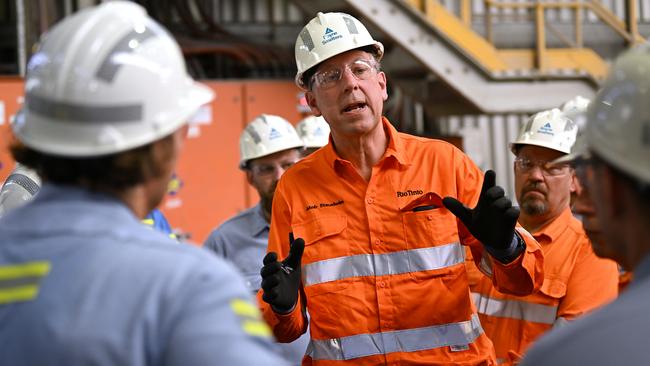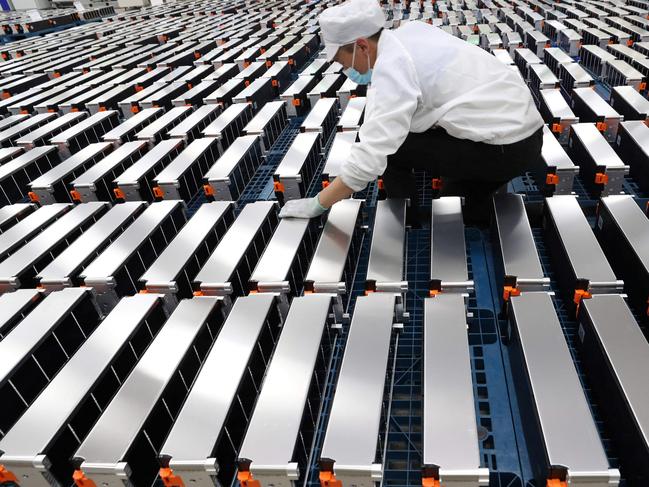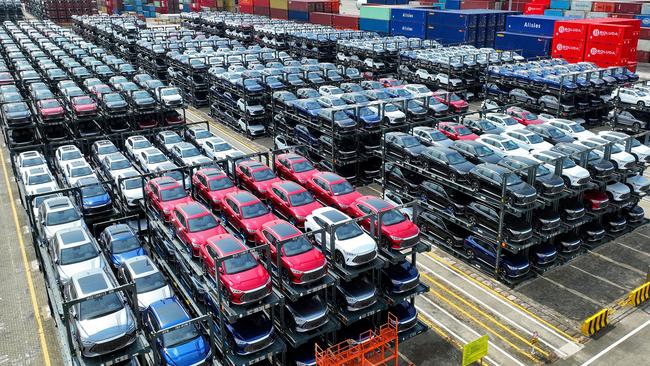Rio Tinto buys lithium giant Arcadium in $9.9bn deal
At $9.9bn, the mining giant is paying a high premium to become one of the world’s biggest lithium producers, as it bets on the future of the critical battery material.

Rio Tinto will buy Arcadium Lithium in a near $10bn bet on the future of the critical battery material that continues to be hit by a global price slump.
Rio Tinto chief executive Jakob Stausholm on Wednesday said the deal, which makes the mining giant one of the world’s biggest lithium producers, was a “risk worth taking” and a significant step in its long-term strategy to create a world-class business needed for the energy transition.
“More lithium mines will be needed to be constructed,” Mr Stausholm told The Australian. “Arcadium brings huge skills to the table particularly in processing capability.
“You can’t just mine – you have to mine and process. The mines are at the lower end of the price curve and are long-life.”
Mr Stausholm said he did not believe Rio had overpaid for Arcadium, which has mining operations in Argentina and Canada.
The $US6.7bn ($9.96bn) all-cash deal for $US5.85 per share represents a premium of 90 per cent to Arcadium’s closing price of $US3.08 per share on October 4.
“You can’t just go to buy something cheaply,” Mr Stausholm. “This is a very fair price and it’s a good day for both the shareholders of Rio Tinto and Arcadium.
“It is an outstanding business today and we will bring our scale, development capabilities and financial strength to realise its full potential.”
He said the deal would not affect Rio Tinto’s dividend policy.
It would also not impact the miner’s planned lithium project in Serbia.
Serbia earlier this year reinstated Rio’s licence to develop what will be Europe’s biggest lithium mine, two years after the previous government halted the process due to concerns from environmental groups. That decision sparked nationwide protests including blockades of roads and railways.
Mr Stausholm said the acquisition filled out Rio’s portfolio of commodities needed for the energy transition that already included aluminium, copper and high-grade iron ore.
“We look forward to building on Arcadium Lithium’s contributions to the countries and communities where it operates, drawing on the strong presence we already have in these regions,” he said. “Our team has a deep conviction in the long-term value that combining our offerings will deliver to all stakeholders.”

Arcadium Lithium chief executive Paul Graves said the deal was a compelling cash offer that reflected “a full and fair long-term value” of the business.
The company was created in January this year through the merger of Australia’s Allkem with South American-focused Livent in a deal at the time valued at $US9.7bn.
That came only two years after Allkem was formed by the merger of Australian lithium stars Galaxy Resources and Orocobre.
Prior to The Australian’s DataRoom column revealing talks were under way on the weekend, Arcadium was valued at a little over $US3bn.
“This agreement with Rio Tinto demonstrates the value in what we have built over many years at Arcadium Lithium and its predecessor companies,” Mr Graves said.
“We are excited that this transaction will give us the opportunity to accelerate and expand our strategy.”
Many lithium companies have been battling a sector downturn by shelving operations and conserving cash. The prices of lithium carbonate, used for industrial-strength batteries, have been hit by a major market oversupply.
Arcadium’s share price has fallen 63 per cent since January amid a global oversupply of lithium but demand for the commodity has been growing at double-digit rates in recent years.
According to market watchers, the deal places Rio Tinto in a position where it is one of the only global miners with a substantial holding in lithium.
But sagging sales for electric vehicles outside China, as well as last week’s confirmation from Beijing that the economy could be in deeper trouble, have added to the bleak prospects for lithium.
Regal Funds boss Phil King last week said lithium “looks heavily oversupplied and we don’t think that’s going to turn around in the short term.”
Association of Mining and Exploration Companies chief executive Warren Pearce said the “deal is a huge vote of confidence for the future of the lithium industry.”
“Rio Tinto has probably noticed that everything has a battery in it,” Mr Pearce said.

Rio said it was confident in the long-term outlook for lithium, with more than 10 per cent compound annual growth rate in demand expected through to 2040 leading to a supply deficit. With spot lithium prices down more than 80 per cent versus peak prices, the deal is described by Rio as a “counter-cyclical acquisition.”
“Combining Rio Tinto and Arcadium’s technological leadership in lithium extraction, the transaction will position Rio to become a market leader in lithium processing,” the company said in ASX documents.
“Rio Tinto looks forward to building on Arcadium’s history of commercial excellence that includes multi-year relationships with leading OEMs and battery companies.”
Arcadium has capabilities in lithium chemicals manufacturing and extraction processes, including hard-rock mining, conventional brine extraction and direct lithium extraction.
Its global operations, comprising approximately 2,400 employees, include facilities and projects in Argentina, Australia, Canada, China, Japan, the United Kingdom and US.
With less revenue coming in the door and more going out to pay for its Argentinian processing project and other manufacturing sites across North America and Canada, Arcadium is expected to be cashflow negative at least for the next four years.
But the company has the ambition of being a fully integrated batteries-grade lithium producer ranking as one of the biggest in the world.
Additional reporting: Eric Johnston



To join the conversation, please log in. Don't have an account? Register
Join the conversation, you are commenting as Logout